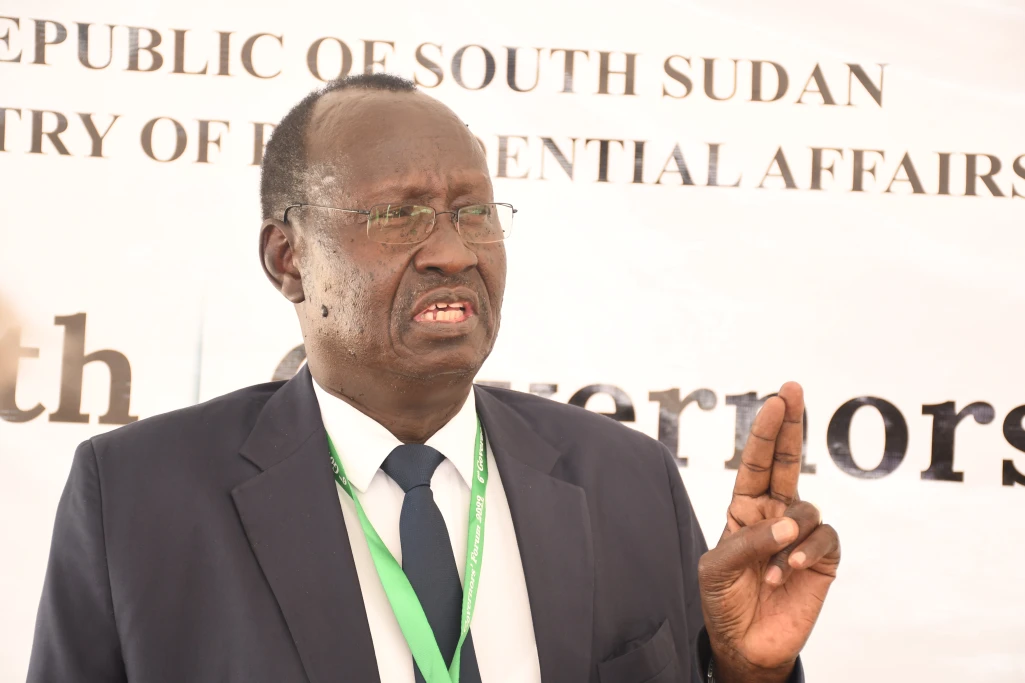
The Chief Administrator of Abyei Administrative Area has accused five politicians from Warrap state of being behind deadly conflicts that have claimed several lives and displaced thousands in the disputed area.
Among those alleged to be behind the violence between Twic and Ngok Dinka are a former governor and members of the Transitional National Legislature.
Violent hostilities between the Twic and the Ngok communities began in February this year over the ownership of a commercial center in Aneet/Amiet/Agok area.
According to the United Nations, over twenty civilians have been killed and thousands of people remain forcibly displaced following destruction of their property and homes.
Abyei Area Chief Administrator Lieutenant General Kuol Deim Kuol pointed fingers at former elected governor Nyandeng Malek and Bona Malual, a renown politician from Warrap state.
He also called out at politicians in Juba for being instigators of the deadly violence.
“We have Buona Malual Madut is responsible for this. Members of Parliament from Twic who are in both national [Council of] states as well as national assembly, Charles Majak Aleel, Dr. Majok Yak, Hon. Nyandeng Malek, Kuany Mayom and others. These are the five leaders who instigated this fighting,” Lt. Gen. Kuol claimed on Tuesday in Juba.
The Chief Administrator spoke at the sideline of the 6th Governors’ Forum in Juba.
The re-emergence of deadly violence between local communities along the boundaries of Warrap state and Abyei Administrative Area has interrupted movement of goods and people, and forced some humanitarian agencies to temporarily suspend operations in Abyei region.
“Normal villagers from Twic are asking themselves, why are we fighting? Simply, the first reason for this war is the incitement by the politicians from Juba. A normal Twic in the village is not aware of why people are fighting,” Lt. Gen. Kuol added.
He further accused politicians in Juba of bribing and manipulating young people to cause havoc in the villages.
“Our people in Northern Bhar El Gahzal are very poor and a poor person can easily be manipulated. You find some of the youth from Twic who are killed, each is given 200 fake U.S dollars in their pocket.”
Lt. Gen. Kuol said he is prepared to prove his allegations.
“As for evidence, my evidence, I reserved them for the court,” he affirmed.
The accused are yet to respond publicly on Lt. Gen. Kuol Deim’s claims.
President Salva Kiir has met in Juba with intellectuals from the Abyei and Twic communities to resolve the crisis.
In October, South Sudan said it has deployed SSPDF forces to quell the fighting in Abyei.
General Gabriel Chol Madol, a commander providing security oversight in the areas of Abyei and Twic said 5 choppers loaded with soldiers arrived in Aneet/Amiet/Agok to restore order.
He said additional 1,500 soldiers were expected to arrive in contested town of Aneet/Amiet/Agok.
But the fighting has not ceased – especially along the main roads connecting Warrap and Abyei areas.
“There is absence of command and control of soldiers, security forces are moving anyhow and looting,” Lt. Gen. Kuol Diem stated.
Ambassador Robert Wood, Alternative Representative of the U.S for Special Political Affairs in the UN urgently called on the government of Sudan and South Sudan to intensify their efforts to end these violent clashes among local communities.
He stated that the formation of joint security and administration institutions, issuance of visas for UN police, and the deployment of a civilian deputy would allow for greater non-military approaches to mitigate conflict and build peace among communities.
The resolution calling for the cessation of hostilities in Abyei was reached during a four days peace conference held in Wau town, Western Bahr el Ghazal state.
The stakeholders settled for a neutral body to facilitate more dialogues to ensure the two communities restore peace and security in the border town.
Follow up conferences are expected to be attended by more chiefs, local authorities, youth, women and political leaders from Twic and Ngok communities.
The agenda would be to address the root causes of the conflict between the two communities.